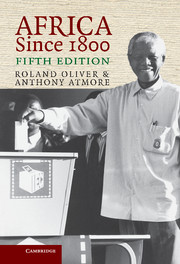Book contents
- Frontmatter
- Contents
- List of Maps
- ONE AFRICA NORTH OF THE EQUATOR
- TWO AFRICA SOUTH OF THE EQUATOR
- THREE THE OPENING UP OF AFRICA: (1) FROM THE NORTH-EAST
- FOUR THE OPENING UP OF AFRICA: (2) FROM THE MAGHRIB
- FIVE WEST AFRICA BEFORE THE COLONIAL PERIOD, 1800–1875
- SIX WESTERN CENTRAL AFRICA, 1800–1880
- SEVEN EASTERN CENTRAL AFRICA, 1800–1884
- EIGHT SOUTHERN AFRICA, 1800–1885
- NINE THE PARTITION OF AFRICA ON PAPER, 1879–1891
- TEN THE PARTITION OF AFRICA ON THE GROUND, 1891–1901
- ELEVEN COLONIAL RULE IN TROPICAL AFRICA: (1) POLITICAL AND ECONOMIC DEVELOPMENTS, 1885–1914
- TWELVE COLONIAL RULE IN TROPICAL AFRICA: (2) SOCIAL AND RELIGIOUS DEVELOPMENTS
- THIRTEEN THE INTER-WAR PERIOD, 1918–1938
- FOURTEEN NORTH AND NORTH-EAST AFRICA, 1900–1939
- FIFTEEN SOUTH AFRICA, 1902–1939
- SIXTEEN THE LAST YEARS OF COLONIAL RULE
- SEVENTEEN THE ROAD TO INDEPENDENCE: (1) NORTH AND NORTH-EAST AFRICA
- EIGHTEEN THE ROAD TO INDEPENDENCE: (2) AFRICA FROM THE SAHARA TO THE ZAMBEZI
- NINETEEN THE ROAD TO INDEPENDENCE: (3) CENTRAL AFRICA
- TWENTY THE LONG ROAD TO DEMOCRACY IN SOUTHERN AFRICA
- TWENTY ONE THE POLITICS OF INDEPENDENT AFRICA
- TWENTY TWO ECONOMICS AND SOCIETY IN INDEPENDENT AFRICA
- TWENTY THREE INTO THE THIRD MILLENNIUM
- EPILOGUE
- Suggestions for Further Reading
- Index
TWENTY ONE - THE POLITICS OF INDEPENDENT AFRICA
Published online by Cambridge University Press: 05 June 2012
- Frontmatter
- Contents
- List of Maps
- ONE AFRICA NORTH OF THE EQUATOR
- TWO AFRICA SOUTH OF THE EQUATOR
- THREE THE OPENING UP OF AFRICA: (1) FROM THE NORTH-EAST
- FOUR THE OPENING UP OF AFRICA: (2) FROM THE MAGHRIB
- FIVE WEST AFRICA BEFORE THE COLONIAL PERIOD, 1800–1875
- SIX WESTERN CENTRAL AFRICA, 1800–1880
- SEVEN EASTERN CENTRAL AFRICA, 1800–1884
- EIGHT SOUTHERN AFRICA, 1800–1885
- NINE THE PARTITION OF AFRICA ON PAPER, 1879–1891
- TEN THE PARTITION OF AFRICA ON THE GROUND, 1891–1901
- ELEVEN COLONIAL RULE IN TROPICAL AFRICA: (1) POLITICAL AND ECONOMIC DEVELOPMENTS, 1885–1914
- TWELVE COLONIAL RULE IN TROPICAL AFRICA: (2) SOCIAL AND RELIGIOUS DEVELOPMENTS
- THIRTEEN THE INTER-WAR PERIOD, 1918–1938
- FOURTEEN NORTH AND NORTH-EAST AFRICA, 1900–1939
- FIFTEEN SOUTH AFRICA, 1902–1939
- SIXTEEN THE LAST YEARS OF COLONIAL RULE
- SEVENTEEN THE ROAD TO INDEPENDENCE: (1) NORTH AND NORTH-EAST AFRICA
- EIGHTEEN THE ROAD TO INDEPENDENCE: (2) AFRICA FROM THE SAHARA TO THE ZAMBEZI
- NINETEEN THE ROAD TO INDEPENDENCE: (3) CENTRAL AFRICA
- TWENTY THE LONG ROAD TO DEMOCRACY IN SOUTHERN AFRICA
- TWENTY ONE THE POLITICS OF INDEPENDENT AFRICA
- TWENTY TWO ECONOMICS AND SOCIETY IN INDEPENDENT AFRICA
- TWENTY THREE INTO THE THIRD MILLENNIUM
- EPILOGUE
- Suggestions for Further Reading
- Index
Summary
The African states which gained their independence during the 1950s and 1960s, mostly by peaceful agreement with the former colonial powers, were born in an atmosphere of political euphoria. They had inherited from their colonial predecessors working systems which, whatever their limitations in respect of personal freedom and whatever the long-drawn-out insult of alien rule, had provided a framework of internal and external security; efficient and disinterested administration; sound finance; a basic economic infrastructure of roads, railways, harbours, and airports; and at least the beginnings of modern social services in education, health, and community development. To these, the new African leadership appeared at first to have added the vital element of political legitimation by mobilising an impressive proportion of the ordinary citizens in support of political parties organised on the western democratic pattern. ‘Seek ye first the political kingdom’, said Kwame Nkrumah, ‘and all these other things shall be added unto you’.
Leaders of the new states at first felt so confident of the internal cohesion of their countries that many of their earliest efforts were directed to foreign affairs. To secure their frontiers, they had to forge new ties with the neighbouring African states, while outside the continent, they had to develop relationships with those industrialised countries other than the former colonial powers which might help them as trading partners, as sources of investment, and as donors of aid for their educational and other needs.
- Type
- Chapter
- Information
- Africa since 1800 , pp. 303 - 322Publisher: Cambridge University PressPrint publication year: 2005



